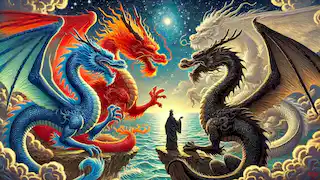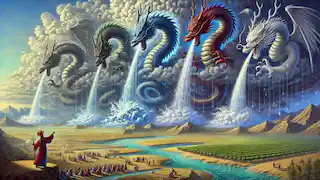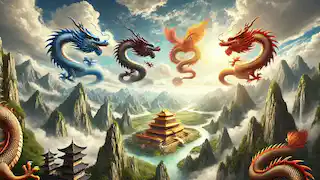Long ago, during the ancient days of China, before the majestic walls of the Forbidden City were built and before the vast dynasties rose to power, there existed only the natural beauty of mountains, rivers, and valleys. In these times, the people of China were humble, simple folk who depended on the benevolence of the heavens for their survival. They tilled the fields, prayed to the gods, and waited for the rains to fall, which would nourish their crops and provide food for their families.
But there came a time when the heavens grew silent. The rains ceased to fall, and the rivers began to dry. The fields, once lush and green, turned brown and brittle. Famine spread across the land like wildfire, and the people, desperate and starving, cried out for help. Their voices rose to the heavens, pleading for relief, but no response came from the Jade Emperor, the ruler of the celestial realms.
It was during these troubled times that the legend of the Four Dragons emerged—a story of bravery, compassion, and sacrifice. In the celestial seas, far above the human world, four great dragons roamed. They were the guardians of the elements, each representing one of the four cardinal directions. There was the Azure Dragon of the East, the Black Dragon of the North, the Red Dragon of the South, and the White Dragon of the West. The Azure Dragon, with shimmering scales the color of a clear sky, ruled over the winds and the rains. The Black Dragon, dark and mysterious, commanded the power of the cold, biting winds from the north. The Red Dragon, fierce and fiery, governed the heat of the sun, while the White Dragon, wise and majestic, controlled the calm of the westward winds. These dragons, though powerful, did not interfere with the affairs of humans. They observed the world from above and only acted when the balance of nature was threatened. However, as they soared above the land, they could not ignore the suffering of the people below. One day, the dragons gathered at the edge of the celestial sea, looking down at the dry, parched lands of China. The people had built altars, burning incense and making offerings in hopes of appeasing the gods, but still, no rain came. "We cannot stand idly by and watch them suffer," said the Azure Dragon, his voice filled with sorrow. "The crops wither, and the rivers are dry. If we do nothing, they will perish." The Red Dragon, always the boldest of the four, roared in agreement. "We are the guardians of nature! It is our duty to ensure that balance is maintained. We must help them." The Black Dragon, who often preferred solitude, nodded gravely. "But we must be cautious. The Jade Emperor does not tolerate interference with the mortal realm. He may punish us if we act without his permission." The White Dragon, the oldest and wisest, spoke calmly. "Perhaps we should go to the Jade Emperor and ask for his help. He is, after all, the ruler of the heavens. If anyone can restore balance, it is he." And so, the four dragons flew up to the heavenly palace, a magnificent structure of gold and jade that sat high above the clouds. The palace shimmered in the light of the sun, and the gates were guarded by fierce celestial beings. The Jade Emperor sat on his throne, his robes made of the finest silks, his crown studded with jewels. When the dragons approached, he greeted them with a stern but curious gaze. "What brings the four guardians to my palace?" he asked, his voice echoing through the grand hall. The Azure Dragon stepped forward. "Your Majesty, the people of the mortal world are suffering. The rains have not fallen for months, and the land is barren. We beg you to send rain to save them." The Jade Emperor listened, but his expression did not change. He waved his hand dismissively. "The balance of nature is not something to be tampered with lightly. The drought will pass in time. The people must learn patience." The dragons, however, were not satisfied with this response. They exchanged uneasy glances, knowing that the people did not have time. Without rain, they would starve. The White Dragon spoke again, this time more urgently. "But, Your Majesty, if the drought continues, the people will die. Surely, there is something we can do?" But the Jade Emperor had already turned his attention to other matters, dismissing the dragons' concerns. Frustrated but unwilling to directly disobey the Emperor, the four dragons left the palace, determined to find another way to help. The four dragons gathered once again at the edge of the celestial sea, their hearts heavy with the knowledge that the Jade Emperor would not intervene. But they could not abandon the people of China to their fate. "I cannot stand by and watch them suffer," said the Azure Dragon, his eyes blazing with determination. "If the Jade Emperor will not act, then we must take matters into our own hands." The Red Dragon, always the most fiery in temperament, nodded in agreement. "We have the power to bring rain ourselves. Why should we wait for the Emperor's permission when we can save them now?" The Black Dragon, though more cautious, could not deny the truth in their words. "But what if the Jade Emperor finds out? He will be furious. He could banish us from the heavens forever." The White Dragon, ever the voice of wisdom, spoke calmly. "If we do nothing, the people will die. And if we are punished for helping them, then so be it. We are guardians of the elements. It is our duty to protect the balance of nature, even if it means defying the Emperor." With their minds made up, the four dragons set their plan into motion. They flew down to the mortal world, their massive forms hidden within the clouds, and began to gather water from the seas. Working together, they lifted great quantities of water into the sky, forming dark clouds that spread across the heavens. The people below looked up in awe as the sky, once clear and bright, became overcast with thick, gray clouds. Soon, the first drops of rain began to fall, and then, in a great deluge, the heavens opened. Rain poured down onto the parched land, filling the rivers and streams, nourishing the crops, and bringing life back to the barren fields. The people rejoiced, dancing in the rain and giving thanks to the gods for their mercy. They did not know that it was the four dragons who had brought the rain, but they were grateful nonetheless. For days, the rain continued to fall, and soon, the drought was over. The rivers swelled with water, and the fields turned green once more. The people had been saved, and the dragons watched from above, content in the knowledge that they had done the right thing. But their actions had not gone unnoticed. In the heavenly palace, the Jade Emperor had been preoccupied with matters of the cosmos, unaware of the dragons' actions at first. But as the rains continued to fall, he grew suspicious. The balance of nature had been restored too quickly, and he realized that someone had interfered. When he discovered that it was the four dragons who had defied his orders and brought the rain themselves, his anger was swift and terrible. "How dare they defy me!" he roared, his voice shaking the heavens. "I am the ruler of the celestial realms! They will pay for their insolence!" Summoning his celestial guards, the Jade Emperor commanded them to capture the four dragons and bring them before him. The dragons, knowing that they had been discovered, did not resist when the guards came for them. They knew that they had done the right thing, even if it meant facing the Emperor's wrath. Brought before the Jade Emperor, the dragons bowed their heads in submission, awaiting their punishment. "You have defied my orders and tampered with the balance of nature!" the Jade Emperor thundered. "For this, you shall be punished. You will be imprisoned beneath the mountains, where you will remain for all eternity, never to see the sky again." With a wave of his hand, the Jade Emperor cast the four dragons down from the heavens. As they fell to the earth, the mountains rose up around them, trapping them beneath the stone. The people of China, unaware of the dragons' sacrifice, continued to live in peace, their fields lush and their rivers full. But the dragons remained trapped, their powerful forms sealed within the mountains. Though the dragons were imprisoned, their spirits were not broken. They had saved the people, and that knowledge gave them strength. Over time, their bodies transformed into the great rivers of China, each dragon becoming a source of life and nourishment for the land they had fought so hard to protect. The Azure Dragon of the East became the Yangtze River, the longest river in China, flowing through the heart of the land and bringing life to the regions it touched. The Black Dragon of the North became the Heilongjiang River, a powerful force that shaped the northern landscape, providing water and sustenance to those who lived there. The Red Dragon of the South became the Zhujiang (Pearl) River, its waters flowing through the southern provinces, rich with life and abundance. And the White Dragon of the West became the Yellow River, known as the "Mother River of China," whose waters carried the fertile silt that allowed civilizations to thrive along its banks . The people of China, though they did not know the full truth, honored the rivers, recognizing them as the lifeblood of the land. Temples were built along their banks, and offerings were made in gratitude for the life-giving waters. Over time, the story of the four dragons was passed down through generations, becoming a legend—a tale of sacrifice, courage, and the enduring power of nature. Though the dragons were no longer free to soar through the skies, their spirits lived on in the rivers that flowed across the land. The people continued to thrive, their lives intertwined with the great rivers that provided water for their crops and homes. And so, the legend of the Four Dragons became a story not only of sacrifice but also of the resilience of nature and the enduring bond between the heavens and the earth. {{{_04}}} Though the dragons had been punished for their actions, their legacy lived on in the rivers that continued to nourish the land. Their sacrifice had not been in vain, for they had saved the people of China and ensured that life would continue to flourish. And to this day, the rivers of China flow with the spirit of the four dragons, a reminder of the power of nature and the importance of balance in all things.The Meeting of the Four Dragons
The Plan to Save the People

The Wrath of the Jade Emperor

The Birth of the Four Great Rivers

The Legacy of the Dragons


















